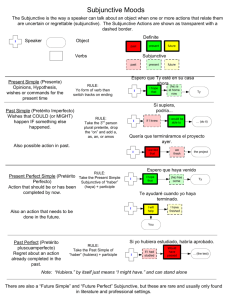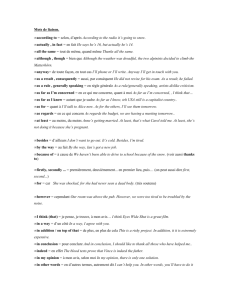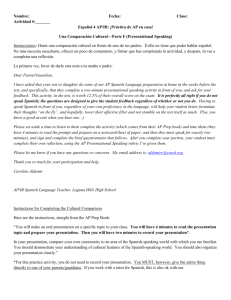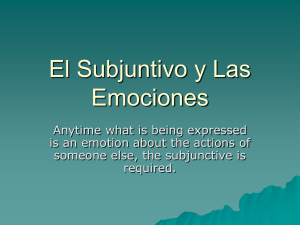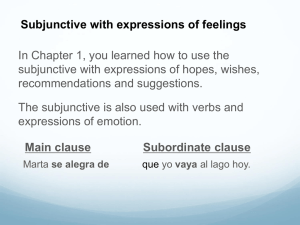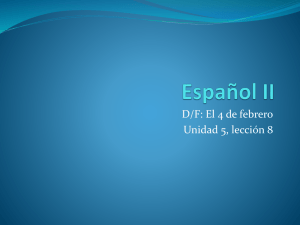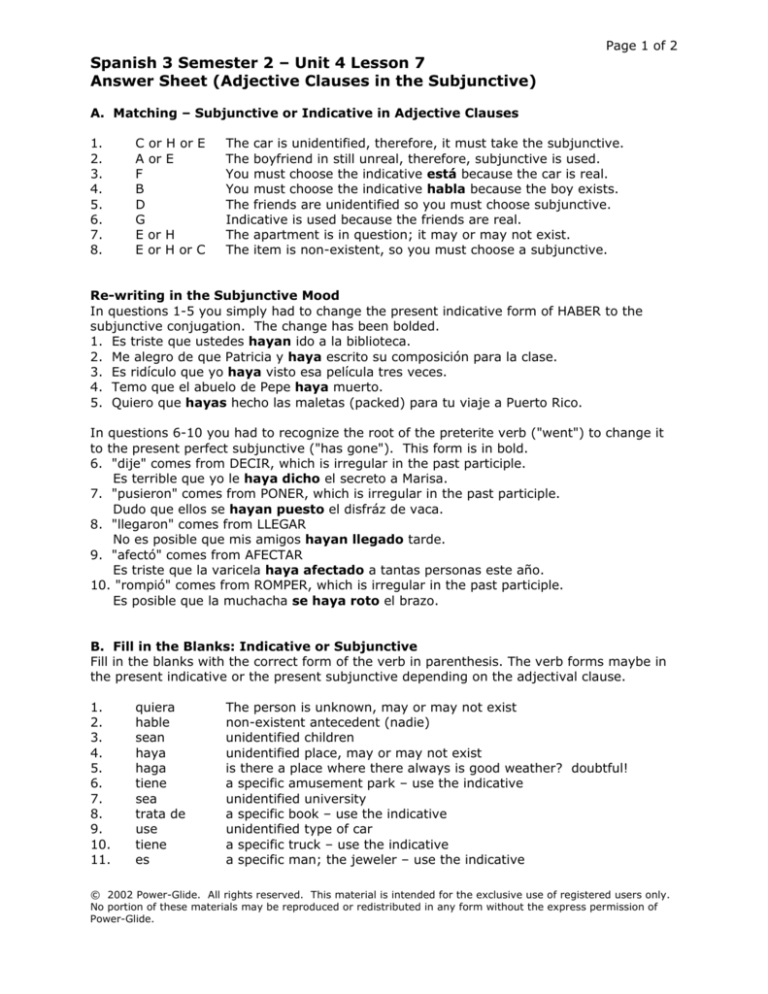
Page 1 of 2
Spanish 3 Semester 2 – Unit 4 Lesson 7
Answer Sheet (Adjective Clauses in the Subjunctive)
A. Matching – Subjunctive or Indicative in Adjective Clauses
1.
2.
3.
4.
5.
6.
7.
8.
C or H or E
A or E
F
B
D
G
E or H
E or H or C
The car is unidentified, therefore, it must take the subjunctive.
The boyfriend in still unreal, therefore, subjunctive is used.
You must choose the indicative está because the car is real.
You must choose the indicative habla because the boy exists.
The friends are unidentified so you must choose subjunctive.
Indicative is used because the friends are real.
The apartment is in question; it may or may not exist.
The item is non-existent, so you must choose a subjunctive.
Re-writing in the Subjunctive Mood
In questions 1-5 you simply had to change the present indicative form of HABER to the
subjunctive conjugation. The change has been bolded.
1. Es triste que ustedes hayan ido a la biblioteca.
2. Me alegro de que Patricia y haya escrito su composición para la clase.
3. Es ridículo que yo haya visto esa película tres veces.
4. Temo que el abuelo de Pepe haya muerto.
5. Quiero que hayas hecho las maletas (packed) para tu viaje a Puerto Rico.
In questions 6-10 you had to recognize the root of the preterite verb ("went") to change it
to the present perfect subjunctive ("has gone"). This form is in bold.
6. "dije" comes from DECIR, which is irregular in the past participle.
Es terrible que yo le haya dicho el secreto a Marisa.
7. "pusieron" comes from PONER, which is irregular in the past participle.
Dudo que ellos se hayan puesto el disfráz de vaca.
8. "llegaron" comes from LLEGAR
No es posible que mis amigos hayan llegado tarde.
9. "afectó" comes from AFECTAR
Es triste que la varicela haya afectado a tantas personas este año.
10. "rompió" comes from ROMPER, which is irregular in the past participle.
Es posible que la muchacha se haya roto el brazo.
B. Fill in the Blanks: Indicative or Subjunctive
Fill in the blanks with the correct form of the verb in parenthesis. The verb forms maybe in
the present indicative or the present subjunctive depending on the adjectival clause.
1.
2.
3.
4.
5.
6.
7.
8.
9.
10.
11.
quiera
hable
sean
haya
haga
tiene
sea
trata de
use
tiene
es
The person is unknown, may or may not exist
non-existent antecedent (nadie)
unidentified children
unidentified place, may or may not exist
is there a place where there always is good weather? doubtful!
a specific amusement park – use the indicative
unidentified university
a specific book – use the indicative
unidentified type of car
a specific truck – use the indicative
a specific man; the jeweler – use the indicative
© 2002 Power-Glide. All rights reserved. This material is intended for the exclusive use of registered users only.
No portion of these materials may be reproduced or redistributed in any form without the express permission of
Power-Glide.
Page 2 of 2
Spanish 3 Semester 2 – Unit 4 Lesson 7
Answer Sheet (Adjective Clauses in the Subjunctive)
12.
esté, sea
unidentified hotel
C. Sentence Creation: Indicative or Subjunctive
Create sentences from the following phrases below. Decide from the information given
whether the new sentence will be in the present indicative or the present subjunctive. Refer
to the model as a guide.
Model:
1.
2.
3.
4.
5.
6.
7.
8.
9.
10.
El supervisor / buscar / un joven / hablar ruso.
El supervisor busca un joven que hable ruso.
Graciela quiere una criada que sepa cocinar bien.
Tú deseas una recepcionista que sea amable con los clientes.
Las jóvenes buscan una tienda de modas que venda prendas de ropa.
Yo tengo una blusa tejida que es muy cómoda. (indicative)
El jefe de la compañía busca alguien que pueda contestar el teléfono cortesmente.
¿No encuentras nada que te guste?
Mateo quiere un apartamento que tenga un balcón.
Nosotros deseamos una casa que no necesite renovación.
Ricardo tiene una novia que es muy simpática. (indicative)
Estoy buscando un novio que tenga un buen sentido de humor.
E. Translation
1.
¿Conoces a alguien que sepa bailar el tango?
2.
¿Hay alguien que tenga un lápiz nuevo?
3.
Necesitamos una persona que haya visitado la ciudad.
4.
Quiero un amigo que sea amable.
5.
Ella busca un hombre que sea alto, moreno y guapo.
© 2002 Power-Glide. All rights reserved. This material is intended for the exclusive use of registered users only.
No portion of these materials may be reproduced or redistributed in any form without the express permission of
Power-Glide.

